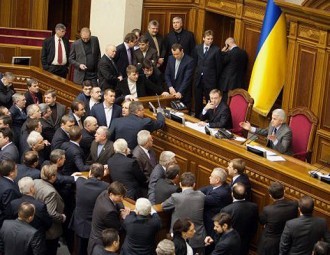Andrei Yahorau: The present Ukrainian Verkhovna Rada is a factor that slows down reforms

Whereas on August 24 Ukraine celebrated its Independence Day, the possibility of dissolution of the Verkhovna Rada was under hot debate. If it happened, how justified this step would have been?
Verkhovna Rada could be dissolved by the Ukraine President Petro Poroshenko during the Independence Day of Ukraine, said Sviatoslav Tsegolko, the press-secretary of the Ukrainian President.
According to the Ukrainian legislation, a President can dissolve Verkhovna Rada in case the coalition that can make decisions by constitutional majority is absent for 30 days. Before July 24, when Aleksandr Turchinov announced that the work of such parliamentary union stops, it was known under the name of “European choice”.
Petro Poroshenko and the heads of parliamentary fractions and deputies groups discussed the possibility of dissolution of the Ukraine Parliament on August 22. However, the President marked that even if it happens it doesn’t mean that the work of the deputies will be stopped immediately, as they still have to consider a number of questions, among which is the forthcoming ratification of the EU Association Agreement.
Does Ukraine really need new elections to the Verkhovna Rada? With this question a correspondent of the “EuroBelarus” Information Service turned to Andrei Yahorau, the head of the Centre for European Transformation:
- Ukraine, surely, does need this election. As today Verkhovna Rada has more powers than the President; its decisions define reforms in the Ukraine and Ukraine’s future on the whole. However, the current membership of the Parliament consists of the same people who put Ukraine into this crisis. Thus, the present Ukrainian Verkhovna Rada is a factor that slows down reforms; so this action is, generally, right. But the main problem of Ukraine now is war. And it will be the main hindrance for the reforms, regardless whether the new membership of the Parliament is elected or not. So, the dissolution of the Parliament can wait. But it is most likely that Petro Poroshenko and Ukrainian PM Arseny Yatsenyuk count that the new convocation of Rada will be more loyal and bound to reforms.
-
03.01
-
07.10
-
22.09
-
17.08
-
12.08
-
30.09










































